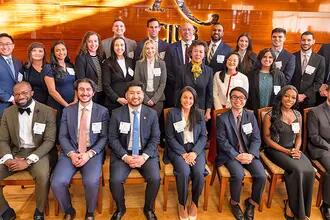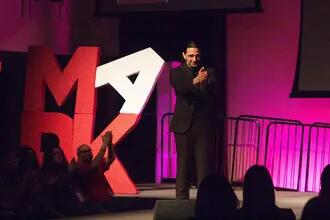
Sophomore Rahul Rana
Discovering a mindset for bold innovation
In September, Rahul Rana will begin his sophomore year at Rutgers Business School-New Brunswick where he’s juggling studies in finance, business analytics and information technology (or BAIT) and cognitive science.
Rana imagined himself working on Wall Street as an investment banker one day, but that changed when he became immersed in entrepreneurship and learned about the power and impact of deeptech, which is the intersection of advanced sciences and technologies. In addition to Little Investment Bankers of Rutgers, Rana is active in Road to Silicon Valley and Road to Wall Street.
Rana spent the summer doing research and content creation for Alchemist Accelerator and Contrary Capital. In late 2020, his first book, Making Moonshots is scheduled to be published by New Degree Press.
Here’s what he had to say about the inspiration of Rutgers Business School’s entrepreneurial ecosystem, having a book to write during the COVID-19 shutdown and the philosophy of “maximizing serendipity.”
What is your favorite organization at Rutgers Business School – so far?
“I would say LIBOR (Little Investment Bankers of Rutgers). LIBOR really brought me into the finance world. I realized that I have a passion for venture capital after being a tech columnist for the LIBOR Financial newsletter.”
How did entrepreneurship captivate you?
“I came into college thinking I wanted to go into finance so like investment banks, sales and trading, something like that. I went to all the club events for organizations that have to do with investment banking. It is great and I love it, but I realized I wanted something more impactful. I realized I really, really loved the finance side of the tech world and hands-on entrepreneurship.”
What’s the most important thing you’ve learned about the entrepreneurial ecosystem at Rutgers Business School?
“The biggest thing for me was the fact that Rutgers Business School, especially the entrepreneurial ecosystem, is a blank slate. What I mean by that is you can do anything you want. You have the classes, the professors, the resources and the opportunities to explore every field out there. I took advantage of that and made the most of it. Rutgers Business School itself and the students here want to do big things. That energy, that grittiness, is really inspiring and definitely really helpful.”
What’s the thinking behind your motto, “Maximizing Serendipity?”
“I’ve learned a lot of lessons about networking and maximizing serendipity. I really believe that if you put yourself out there, you maximize the chance of luck happening to you or people coming to you with opportunities and you’ll have a better chance of doing cool things.”
What inspired you to write a book?
“There is a quote that I really like, and it inspired my entire book. It’s a quote from Alan Kay, the famous computer scientist. He said, "the best way to predict the future is to create it." To me, that means the best way to build a better future for the world is by attempting to work on the boundaries of what's currently possible – essentially deeptech. I really am optimistic that with these newfound capabilities, we can solve global problems, whether it's food scarcity, ensuring planetary health or creating new therapeutics. I want to teach people about the mindset behind the founders of organizations such as SpaceX, CTRL Labs and X Moonshot Factory because once they have the mindset, they can do anything. My life's goal is to inspire more moonshot companies. This is just my first step. ”
What was it like writing a book during freshman year?
“I started the book in January. It was really tough at first. It meant sacrificing some things like hanging out with my friends and club events. I'm not going to say it was a fortunate event, but most of my writing happened during the lockdown.”
- Susan Todd
Press: For all media inquiries see our Media Kit


